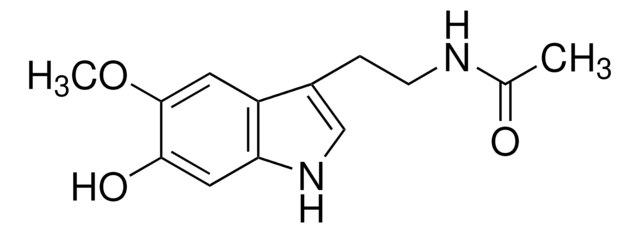M5820
M344
≥98% (HPLC), powder
Sinónimos:
4-(Dimethylamino)-N-[7-(hydroxyamino)-7-oxoheptyl]-benzamide, MS 344, D237, N-Hydroxy-7-(4-dimethylaminobenzoyl)-aminoheptanamide
About This Item
Productos recomendados
Quality Level
assay
≥98% (HPLC)
form
powder
storage condition
protect from light
color
white to beige
solubility
DMSO: 10 mg/mL, clear
storage temp.
2-8°C
SMILES string
CN(C)c1ccc(cc1)C(=O)NCCCCCCC(=O)NO
InChI
1S/C16H25N3O3/c1-19(2)14-10-8-13(9-11-14)16(21)17-12-6-4-3-5-7-15(20)18-22/h8-11,22H,3-7,12H2,1-2H3,(H,17,21)(H,18,20)
InChI key
MXWDSZWTBOCWBK-UHFFFAOYSA-N
Biochem/physiol Actions
Features and Benefits
related product
Storage Class
11 - Combustible Solids
wgk_germany
WGK 3
flash_point_f
Not applicable
flash_point_c
Not applicable
Elija entre una de las versiones más recientes:
Certificados de análisis (COA)
¿No ve la versión correcta?
Si necesita una versión concreta, puede buscar un certificado específico por el número de lote.
¿Ya tiene este producto?
Encuentre la documentación para los productos que ha comprado recientemente en la Biblioteca de documentos.
Artículos
We offer a variety of small molecule research tools, such as transcription factor modulators, inhibitors of chromatin modifying enzymes, and agonists/antagonists for target identification and validation in gene regulation research; a selection of these research tools is shown below.
We offer a variety of small molecule research tools, such as transcription factor modulators, inhibitors of chromatin modifying enzymes, and agonists/antagonists for target identification and validation in gene regulation research; a selection of these research tools is shown below.
We offer a variety of small molecule research tools, such as transcription factor modulators, inhibitors of chromatin modifying enzymes, and agonists/antagonists for target identification and validation in gene regulation research; a selection of these research tools is shown below.
We offer a variety of small molecule research tools, such as transcription factor modulators, inhibitors of chromatin modifying enzymes, and agonists/antagonists for target identification and validation in gene regulation research; a selection of these research tools is shown below.
Nuestro equipo de científicos tiene experiencia en todas las áreas de investigación: Ciencias de la vida, Ciencia de los materiales, Síntesis química, Cromatografía, Analítica y muchas otras.
Póngase en contacto con el Servicio técnico






